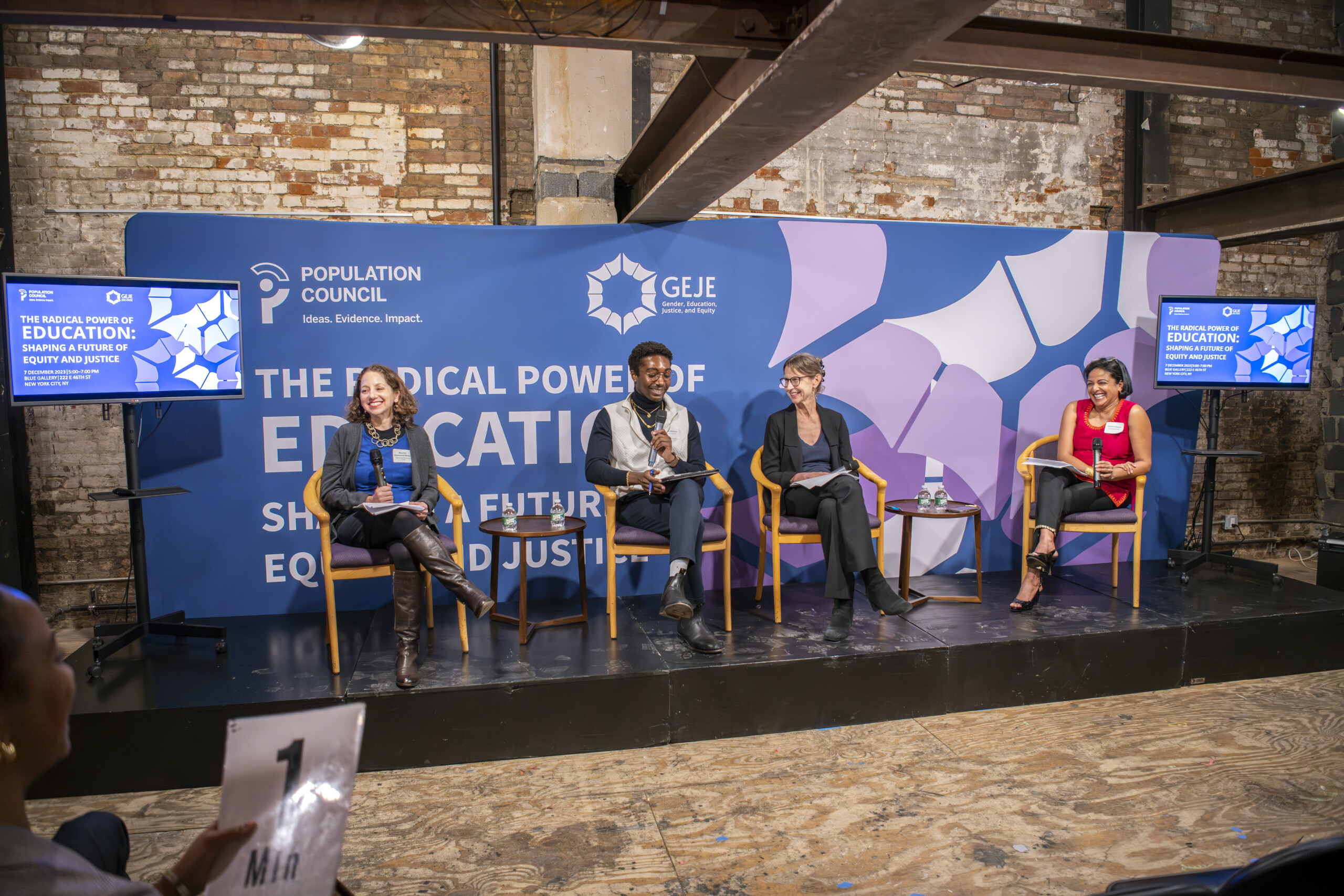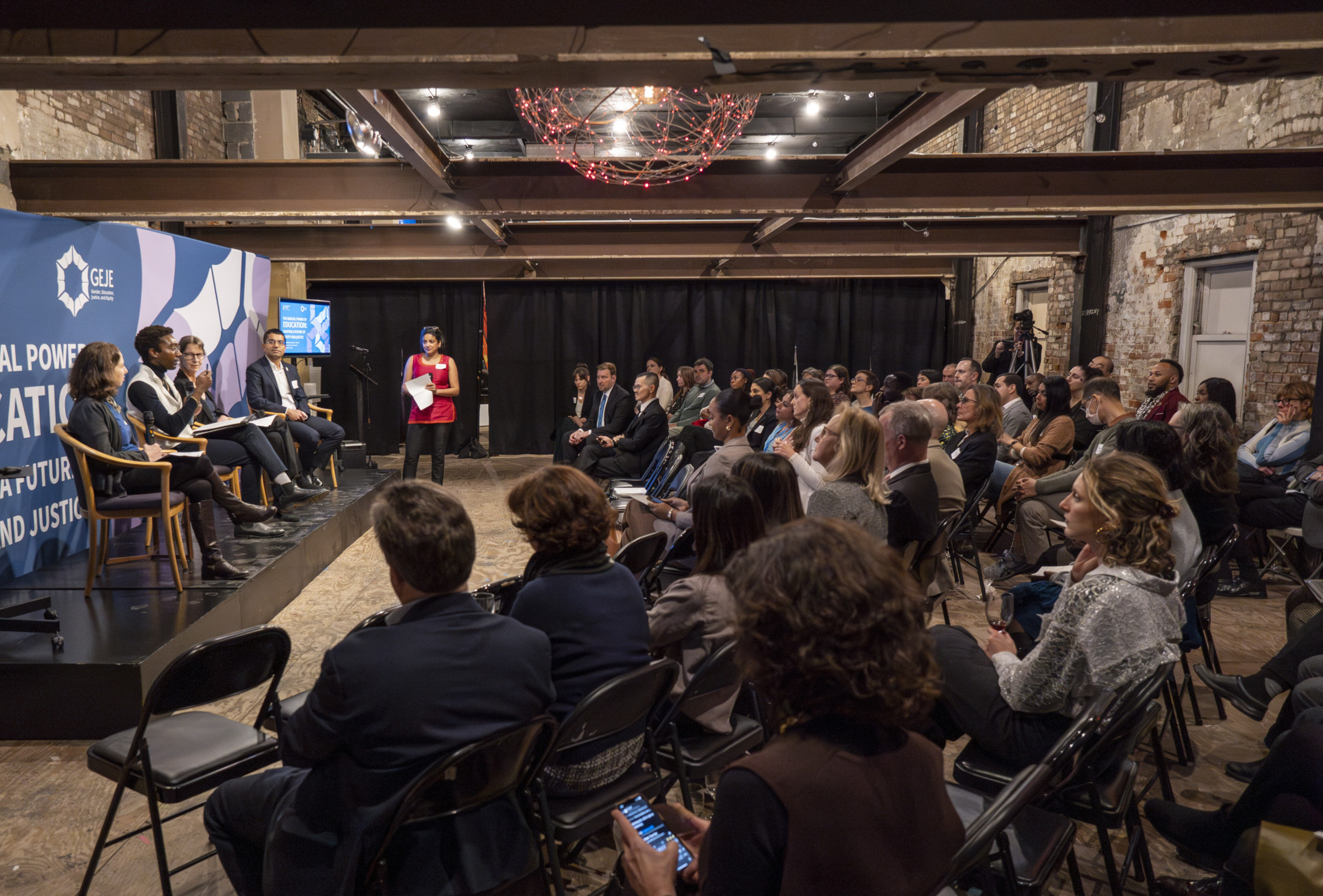
The radical power and potential of education must be both leveraged and revitalized in the face not only of a global learning crisis but of overlapping crises of climate, democracy, and social stability. More than 500 million children are unable to read or do basic math, including seven out of ten in low- and middle-income countries (LMICs), and reading and math scores continue to decline in the United States.
Against this backdrop, the Population Council launched the Gender, Education, Justice, and Equity (GEJE) initiative on December 7th in New York City with a conversation among researchers, activists, and philanthropists moderated by award-winning journalist Kavitha Cardoza with an audience of educators, funders, education experts, and representatives from United Nations agencies.
GEJE focuses on tackling the global learning crisis and inequities in participation by generating data and insights on the ripple effects of education, unpacking how progress in education can translate into economic and social equity, and identifying programs that are working to eliminate inequity and injustice.
For instance, GEJE researcher, Arindam Nandi, shared a new analysis showing that universal secondary education in low- and middle-income countries (LMICs) could boost annual gross national income (GNI) by $8.1 trillion for young adults aged 15-24 years, reduce the annual number of child marriages by 2 million, and reduce the number of women aged 15-49 who experience any form of intimate partner violence (IPV) by 81.3 million.
GEJE recognizes that education is “more than just academics,” in Cardoza’s words—it can shape social norms and power social change.
Insights and Intersections: The GEJE Launch
Speakers and panelists in conversation described interdependencies between progress in gender equity and progress in education: securing equitable access and learning for all children and young people is foundational to harnessing educational environments to advance social justice more broadly.
“Education is in every country, it can go the last mile to every child, it has a built-in accountability mechanism, and it can advance social justice,” said Maureen Greenwood-Basken, Program Director for Global Children’s Rights at the Wellspring Philanthropic Fund.
Speakers highlighted the importance of intersectional education research as vital to fulfilling the radical power of education for all. Greenwood-Basken described how it was only through deeper research in Guatemala that it became clear that familiar tropes about adolescent pregnancy and school dropout were not what they appeared: most girls were dropping out first, and having children later. The barrier to education wasn’t pregnancy, rather, it was disengagement from the curriculum and the low value placed on education for girls compared to motherhood. Applying this contextual evidence in practice led to effective interventions such as shifting instruction into local languages and directly addressing regressive gender norms around motherhood and learning.
Education —while holding enormous potential – is not a panacea for shifting entrenched social inequities.
Structural inequities stand in the way of realizing the promise of education as a human right and as a central pillar of Sustainable Development Goal 4: ensure inclusive and equitable quality education and promote lifelong learning opportunities for all. In the state of Kentucky, for instance, public education is guaranteed by the State constitution, by Federal law, and by United Nations agreement. But in practice, as panelist Andrew Brennen observed, the state’s Black students are pushed out of the classroom: the annual number of expulsions and suspensions of Black students has exceeded the total number of Black students in Kentucky’s schools. This system results in substantially lower educational outcomes for Black students by the time they are in third grade.
Brennen, who founded the Kentucky Student Voice Team, an activist group, in high school, now is studying civil rights law at Columbia University. He mentioned recent efforts by students across the US to sue school districts that are denying them the right to education. Such a rights-based approach is one way to tackle structural barriers –one of the focus areas GEJE plans to address in its research across regressive gender norms, racism, and economic inequalities.
“What I love about GEJE’s approach is how fundamentally intersectional it is,” Brennen said. “It’s not just about what’s happening in the classroom, it’s about every interaction and every intersection that is brought into the classroom.”
Nicole Haberland, GEJE Director, spoke to similarly intersectional barriers that girls and women face around the world. Regressive gender norms and power inequalities shape which children can get to schools, which children can afford to stay there, and whether they have the same opportunities to leverage education for good jobs, political representation, and wellbeing.
Haberland concluded with an inspiring insight into GEJE’s efforts in dismantling gender and structural barriers to foundational learning, including creating safe spaces for girls to learn and installing locally sourced solar panels in schools. GirlsRead! Zambia demonstrated significant improvement in girls’ literacy and reasoning skills. This was achieved via mentored after-school groups, a structured curriculum, and e-readers filled with books catering to various reading levels, many of which included strong female protagonists and non-traditional gender roles.
GEJE’s work is urgent. Left unaddressed, the global education crisis will undermine progress in other areas as much of the largest generation in history enters a future for which they are unprepared. Responding to today’s education crisis and future ones, education systems need to provide children and young people with the ability to problem solve and build alliances rooted in civic engagement, democratic values, and equity. We need a new social contract for education that repairs injustices while transforming the future.
To close the conversation, Thoai Ngo, Vice President for Social and Behavioral Science Research, quoted bell hooks, “The academy is not paradise. But learning is a place where paradise can be created.”
Gender, Education, Justice, and Equity (GEJE) is a new innovation hub at the Population Council that focuses on tackling the global learning crisis and inequities in participation. GEJE generates data and insights on the ripple effects of education, unpacks why progress in education has not translated into economic and social equity, and identifies programs that are working to eliminate inequity and injustice. Contact geje@popcouncil.org.
Read the brief on the Radical Power of Education. For the full report, click here.
Pictured in bottom photo, from left to right: Maureen Greenwood-Basken, Andrew Brennen, Nicole Haberland, Arindam Nandi, and Kavitha Cardoza.

